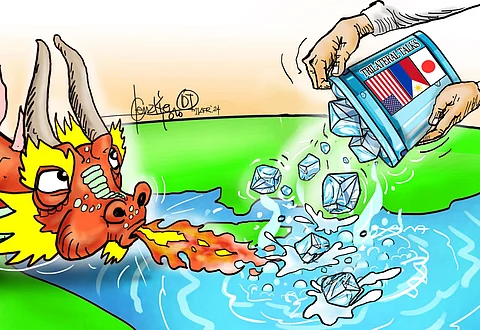

The world has huge expectations the landmark meeting in Washington among the leaders of the Philippines, Japan, and the United States will strengthen peace and security in the Indo-Pacific region.
Troubled by pockets of armed conflicts, the world is anxious over the possibility of another crisis.
The trilateral conference is billed as not being directed against any country, but lately, one source of concern has been China’s stubborn position in enforcing its border demarcations.
In 2016, the Permanent Court of Arbitration in The Hague, backed by the United Nations, ruled that China’s nine-dash line had no basis in international law.
China, however, said it did not recognize the ruling and would only negotiate without the involvement of third-party nations or bodies.
The gathering in Washington DC is pivotal as it comes at a time when maritime tension is nearing a tipping point towards a situation that would be hard to turn back from.
Among the expected outcomes of the tripartite summit is increased cooperation in maritime exercises among the allies.
Vikram Singh, senior advisor to the Asia Program at the Washington-based US Institute of Peace, said, “We are going to see more joint patrols in the Philippines’ exclusive economic zone, and I think we’re going to see a lot more maritime awareness.”
“I wouldn’t be surprised to see an agreement on illegal fishing, which is a major challenge, and a lot of it is done by the Chinese fishing fleet,” he added.
The expert believes that strengthening civilian rather than military engagements is the key to de-escalating tensions in the West Philippine Sea.
While the Philippine Coast Guard is strengthened, Japan is expected to ramp up its new overseas security system program, “which is unprecedented in terms of exporting military equipment and systems and providing security assistance to countries in the region for the first time since World War 2.”
Such assistance started with the Philippines enhancing its radar systems.
“We will see more coordination in how the US, Japan, and the Philippines will work together to build Filipino capabilities for the military and the Coast Guard,” Singh noted.
“The Chinese are enforcing their claim to territories which incidentally was declared to have no basis in international law,” he said.
He added that China, “rather than talk, wants to assert its position, take territories and establish new realities on the ground.”
The three nations will be hammering out a deal towards détente.
Singh said that lowering the threshold of the conflict by increasing the role of coast guards in maintaining order in the disputed area will also be on the table.
“That would keep the dispute in the civilian space rather than the military, so I expect an announcement on increased joint coast guard activities to help to manage the tensions better,” he said.
He said announcements on deepening assistance by the two progressive countries to the Philippines are also forthcoming.
The efforts will be directed towards strengthening the capability of the country to enforce its legal claims and protect these from Chinese encroachment.
Singh cited the case of Scarborough Shoal, in which China “just took over and militarized” when it should have been “negotiating.”
The reality is that one country is being aggressive with its claims rather than negotiating. This one country has flaunted a landmark international ruling and engaged in increasingly aggressive and dangerous actions against the Philippines.
Such concern will be addressed in a rather innovative way which involves making the Philippines more capable of protecting its sovereign expanse as guaranteed under international law.
